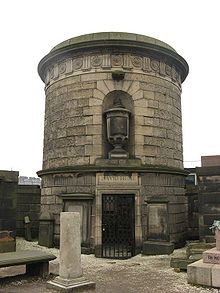

David Hume, Baron Hume of Ninewells FRSE (1757–1838) was a Scottish advocate, judge and legal scholar, whose work on Scots criminal law and Scots private law has had a deep and continuing influence. He is referred to as Baron Hume to distinguish him from his uncle, David Hume the philosopher.
Hume was educated at the universities of Glasgow and Edinburgh. He became an advocate in 1779, and in 1786 was appointed Professor of Scottish Law at the University of Edinburgh, a post he retained until 1822, when he took up office as a Baron of Exchequer. In 1785 he married Jane Alder. They had three sons and three daughters.
Hume’s writings on criminal law culminated in his Commentaries on the Law of Scotland, Respecting Trial for Crimes (1797), a work that has continued to be cited in court into the 21st century. During his lifetime he never published his lectures on Scots private law, and indeed expressed the wish that they should not be published posthumously. But manuscript copies were widely circulated and were influential, sometimes being cited in court. Eventually they were published, in six volumes, between 1939 and 1958. The result was a revival of their influence, not least in the field of property law.
Early life and education
David Hume was baptised 27 February 1757 at Chirnside, Berwickshire, a son of John Hume of Ninewells (1709–1786) and his wife, Agnes née Carre (1725–1785); he was a nephew of the philosopher David Hume.
From 1765 to 1767, he was enrolled as a pupil at Edinburgh high school and then studied at the University of Edinburgh where, in 1774, he studied Roman Law. He matriculated as a law student at the University of Glasgow in 1775 where he remained until 1777 and lodged with Professor John Millar, "then the most celebrated law teacher in the British Isles." In 1777 and 1778 he was a registered student of Scots law in Edinburgh.
Advocate, sheriff-depute, professor, baron
Hume was admitted as to the Faculty of Advocates in 1779. In 1783 he was favoured with the appointment as part-time sheriff-depute of Berwickshire. In December 1786, he added to these the chair in Scots law in the University of Edinburgh.
In 1793 he left the sheriffdom of Berwickshire for that of Linlithgowshire. In 1811 he was made a principal clerk of session and resigned his post as sheriff.
In 1822 Hume became Baron David Hume on his appointment as Baron of the Exchequer. When he resigned from his professorial post, the university awarded him the degree of LLD.
Family life

On 24 February 1785 he married Jane Alder and they had three sons and three daughters. She died in 1816 and he then married Jean Veitch Somner. Following his death she married Charles Maclaren.
On 27 July 1838 he died at his home, 37 Moray Place in Edinburgh and was buried in the Hume mausoleum at Calton cemetery, Edinburgh.
His three sons, John, David and Joseph, are buried with him.
References
- ^ John W. Cairns, "Hume, David (bap. 1757, d. 1838)", Oxford Dictionary of National Biography, Oxford University Press, 2004; online edition, May 2007, doi:10.1093/ref:odnb/14142 accessed 22 Oct 2011.
- Baron David Hume's Lectures, 1786–1822, ed by G. C. H. Paton.
- Biographical Index of Former Fellows of the Royal Society of Edinburgh 1783–2002 (PDF). The Royal Society of Edinburgh. July 2006. ISBN 0-902-198-84-X. Archived from the original (PDF) on 24 January 2013. Retrieved 14 November 2016.
- Edinburgh Post Office directory 1835
- Inscription of David Hume's grave, Old Calton Cemetery
- G. C. H. Paton, ‘Biography of Baron Hume’ in Vol. 6 of Baron David Hume's Lectures, 1786–1822, ed by G. C. H. Paton.
- David M. Walker, The Scottish Jurists (1985) chapter 19.
- 1757 births
- 1838 deaths
- Members of the Faculty of Advocates
- 18th-century Scottish lawyers
- Alumni of the University of Glasgow
- Alumni of the University of Edinburgh
- Academics of the University of Edinburgh
- Scottish legal scholars
- Barons of the Court of Exchequer (Scotland)
- Scottish legal writers
- People from Berwickshire
- People educated at the Royal High School, Edinburgh
- Principal Clerks of Session and Justiciary
- Burials at Old Calton Burial Ground
- Founder fellows of the Royal Society of Edinburgh
- 18th-century British civil servants
- 19th-century British civil servants
- 18th-century Scottish writers
- 19th-century Scottish writers